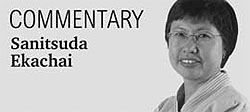COMMENTARY
Writer: Sanitsuda Ekacai
It is one thing to nurse concern for small-scale farmers. It is another thing, however, to make foreigners the scapegoats. For the so-called backbone of the country, the lack of farmland indeed poses a serious problem to Thai farmers, who are also struggling with indebtedness from the high cost of farm investment amid chronically low prices, while their once fertile soil is rapidly dying due to intensive chemical farming. Should we focus on the root of their problems instead of resorting to xenophobia?
The recent spate of news on proxy ownership of rice farmland by rich foreign investors has stirred much public anxiety and nationalist fervour, although much of the news has been based on the news sources' concerns, rather than on concrete evidence. According to these news reports, the foreigners - mainly those from oil-rich Arab countries - are buying up rice paddies in the countryside and hiring the locals to till the land in order to ensure sufficient rice supply for their countries, and to benefit financially from the various rice support schemes offered by the government.
While this story is going nowhere, reportedly due to the farmers' fear to talk, the latest news angle focuses on the foreign husbands of Thai women who, through their wives, are buying up farmland in scenic areas in order to build resorts.
Yes, we should be concerned about the farmers' rapid loss of land. But aren't we pointing the finger in the wrong direction?
When the government launched the Green Revolution 40 years ago with an aim to make Thailand the world's biggest rice exporter, every farmer dreamed that the high-yield rice varieties and chemical rice farming would make them prosperous for good. No one knew that they would soon suffer from frequent pestilence as a result of mono-culture farming and a losing business. How could they survive when fluctuating rice prices in the world market just could not keep up with the skyrocketing prices of farm chemicals?
While the farmers wilt, intensive chemical farming destroys soil fertility, contaminates the waterways, causes various illnesses from chemical residue in the food chain, or simply maims and kills farmers from prolonged over-exposure to hazardous chemicals.
And now when the farmers feel they know better and are trying to switch to organic farming and herbal pesticides, guess who are their main opponents? Who else but the farm chemical giants - and our very own agricultural authorities.
Remember their efforts to list such medicinal herbs that are widely used for herbal pesticides as "hazardous" and thus subject to tight control? Guess why.
Amid the losing business of rice farming, many farmers decided to sell their land to speculators under rising demand from the tourism industry and the urban middle class' need for holiday homes. For those who wanted to keep the land, many experimented with contract farming with big business, only to find themselves in the same trap of chemical farming and empty promises.
Out of familial gratitude, many daughters of poor farmers entered the sex trade to support their families. Many are severely exploited. Many have died from work-related sicknesses. But some, too, found love and security through marrying foreigners. They set up families and started doing business, as all couples do. We should be happy for them, shouldn't we? Why should we harass them with this proxy land ownership fervour?
Is it because it is much easier to hassle them than take to task the big investors, Thai and foreign, who are paying the land officials big time to get prime resort locations illegally?
Or is it because they prefer to turn a blind eye to the inequitable land ownership system, knowing that the politically powerful landlords are here to stay, regardless of their political colours?
Have some guts. Deal with destructive farming. Deal with big landlords. Deal with corrupt officials.
If the government cannot address the real cause of landlessness, leave those women who now have a life with their foreign spouses alone.
Sanitsuda Ekachai is Assistant Editor (Outlook), Bangkok Post.












